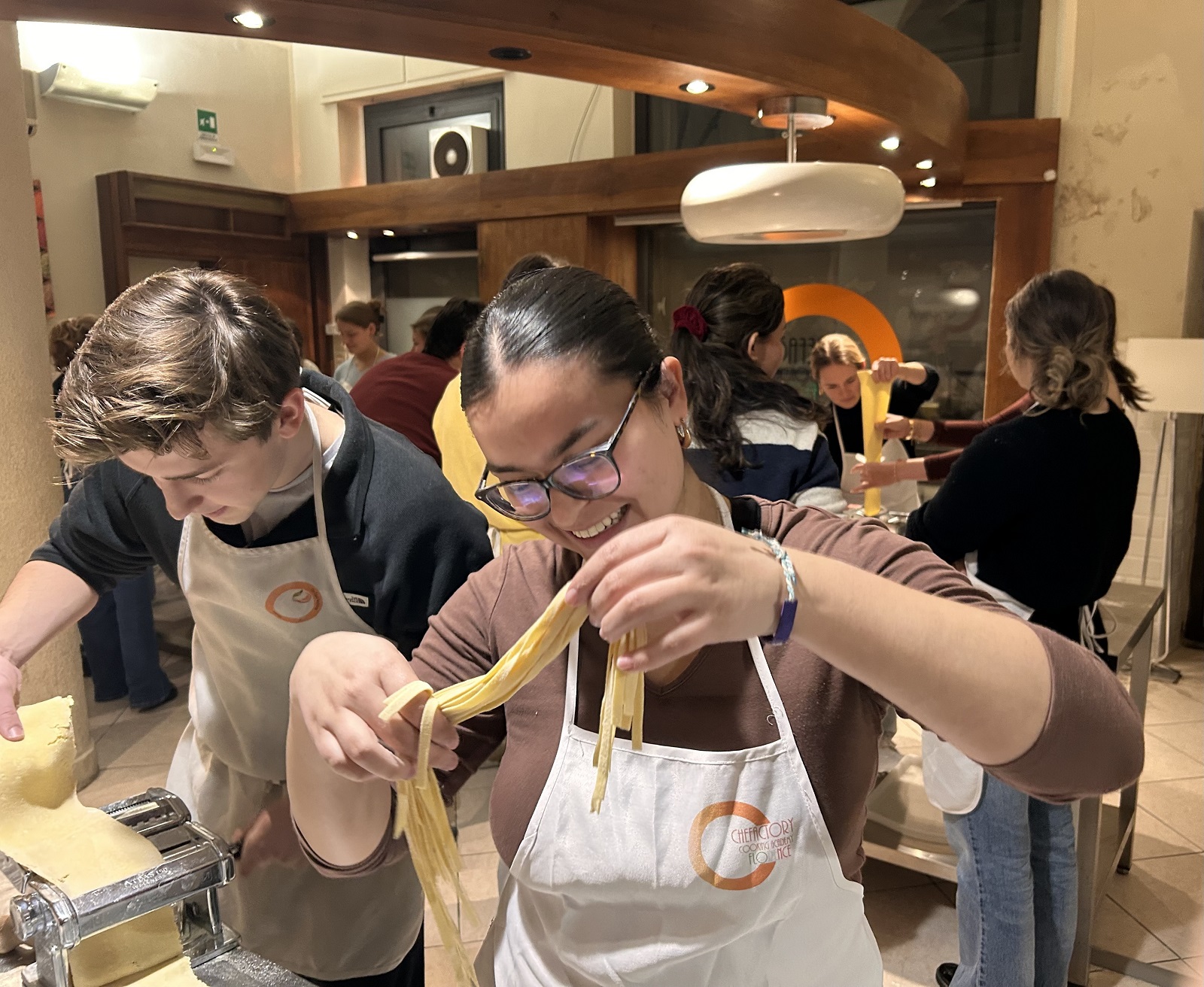Written by Patty Bessie (Columbia University), Student Correspondent for CET Florence, Spring 2025
Studying abroad is an exciting opportunity to explore new cultures, gain independence, and make lifelong memories. However, adjusting to life in a foreign country comes with challenges, from packing the right essentials to navigating unfamiliar customs and languages. Proper preparation can help ease the transition and ensure a smooth, enjoyable experience. This guide provides practical tips for studying abroad in Florence including what to bring, how to adapt, and what to expect while living and studying there.
Packing Essentials
Must-Have Items for Daily Life & Travel
- Portable Charger – Essential for navigating new cities and taking day trips without worrying about battery life.
- Reusable Water Bottle – In many countries, including Italy, water is not free at restaurants, so having a refillable bottle saves money.
- Flip-Flops – A must if you stay in hostels and need shower shoes for communal bathrooms.
- Microfiber Towel – Many hostels charge for towels, so bringing your own saves money.
- Travel Backpack – Ideal for weekend trips and exploring.
- TSA-Approved Locks/Hostel Locks – Hostels often provide lockers but not locks, so bring your own for security.
- Travel-Size Bottles – Useful for short trips where you can’t bring full-sized toiletries.
- Pro-Tip: Pack your quarter-sized clear bag of toiletries in your carry-on along with outfits for 4 days or so. International flights, regardless of airline, are notorious for losing luggage. By packing these essentials in your carry-on, you can ensure you will have clothes and necessities while you wait for your luggage to be delivered.
- Comfortable Sneakers – In cities like Florence, where cobblestone streets are common, comfortable walking shoes are necessary.
- Umbrella – Weather can be unpredictable, so it’s good to have one handy.
- Puffer Jacket or Warm Coat – If studying abroad in the spring, keep in mind that many programs begin in winter when temperatures can drop to the 30s and 40s (Fahrenheit).
- Basic Clothing – Stick to neutral-colored long- and short-sleeve tops that can be easily mixed and matched. Keep in mind that laundry machines are small, and dryers are uncommon in Italy, so pack light.
- Outlet Adapter & Converter – Europe uses different plugs than the U.S., so bring an adapter to charge your devices.
- Snacks from Home – If you have favorite foods or condiments, consider packing some as they might not be available in your study abroad destination.
- Tote Bag – Useful for carrying groceries, souvenirs, or daily essentials.
- Deodorant & Toiletries – Some products you’re used to may not be available abroad.
- Apple AirTag, Tile, or Luggage Tracker – Helps keep track of your bags, backpack, or wallet.
- Medicine (e.g., Ibuprofen, Prescription Medications) – Bring what you regularly use and ensure you have enough for your stay.
- Ask your doctor for a prescription/doctor’s note outlining what the prescription is for. If you are stopped at customs, you can present this note to ensure your medication is not thrown away.
- Period Products (Tampons, etc.) – Some countries may not carry the brands or types you prefer.
- Fanny Pack or Money Belt – Helps protect valuables from pickpockets.
- Extra Empty Bag for Souvenirs – Bring a foldable duffel to use as an additional checked bag for your return flight.
Basic Language Skills to Learn
Ways to Improve Language Skills Before Departure
To improve your language skills before departure, consider incorporating daily practice into your routine. Apps like Duolingo, Babbel, or Ling can help you build vocabulary. Listening to music and watching movies in your host country’s language can also expose you to natural speech patterns and improve comprehension. If possible, you should consider taking a language class before studying abroad through your host institution. Additionally, challenging yourself by reading a children’s book in the target language is a fun and effective way to familiarize yourself with basic sentence structures and common phrases.
Knowing a few key phrases can help…
- Porta via – To-go (for food orders)
- Prendo/Vorrei – “I’ll take” / “I’d like” (for ordering)
- Dov’ è il bagno? – Where is the bathroom?
- Non lo so – I don’t know
- Mi dispiace – I’m sorry
- Permesso/Scusa – Excuse me
- Ciao – Hi/Bye
- Salve – Hello (formal)
- Non capisco l’italiano – I don’t understand Italian
- Cosa? – What?
- Quanto costa/costano? – How much does this cost/these cost?
- Perché – Why?
While fluency isn’t necessary to get by in an international city like Florence, making an effort to speak Italian can lead to better treatment and more meaningful interactions. Imagine if people in your home country were expected to learn a new language just because thousands of tourists visited each year without attempting to speak the local language—it would be frustrating. A small effort, like ordering a coffee in Italian, can go a long way in showing respect for the culture. Locals, whether in Italy or anywhere else, shouldn’t have to accommodate American visitors by learning English who are merely guests in their country.
What to Expect & Prepare For
Independence & Navigating New Situations
Be comfortable being alone – While you’ll be surrounded by people, there will be times when your schedule doesn’t align with your friends, and you may find yourself eating or exploring on your own–and that’s completely okay. In fact, these moments can be an opportunity for personal growth. Learning to enjoy your own company allows you to embrace new experiences without relying on others. Over time, you may even come to cherish these moments, discovering the freedom to try new things and explore at your own pace without waiting for someone to join you.
Get used to public transportation – After spending three years in New York City, I felt well-prepared to navigate Italy’s transit system, and that experience proved invaluable. Learning to use buses, trains, and metros not only made getting around easier but also saved me a significant amount of money compared to relying on taxis. Public transportation is often the most budget-friendly way to explore a new city, so familiarizing yourself with it before arriving can make a big difference in your overall experience abroad. Even if you don’t live in a city with good public transportation infrastructure, challenge yourself by taking the bus once or twice just so you can practice.

Pre-Departure To-Do List
Open a credit card with no foreign transaction fees – Foreign transaction fees can add up quickly, so getting a credit or debit card that waives them is a smart move.
- Discover It Student Card is a popular option among college students, but keep in mind that Discover is not widely accepted in Italy, making it a poor choice for studying abroad.
- Revolut is a great alternative. While it is a debit card, not a credit card, it has no foreign transaction fees within Europe and it is widely accepted across the continent. It is easy to use and can be managed through their app. This is also a great option if you do not have a credit score and therefore are having issues with opening a credit card!
Take care of medical appointments – Before heading abroad, schedule all essential medical visits to avoid navigating a new healthcare system for routine check-ups.
- Visit the dentist, doctor, and any specialists before departure.
- Refill prescriptions in advance, and ask your doctor if you can get a prescription to cover you for the length of your stay abroad.
- Print a doctor’s prescription for any medications you bring in case customs requests proof.
- Get necessary vaccinations, including a flu shot, for both general health and travel requirements.
Notify your bank and prepare local currency – Avoid being without money while abroad by preparing appropriately beforehand.
- Inform your bank and credit card companies of your travel plans to prevent temporary holds.
- Order local currency before departure. Bring 100-400 euros in cash as a backup in case your card doesn’t work right away. Keep in mind that some banks take 3-7 business days to fulfill these orders, therefore you don’t want to wait until the last minute to do this! Also, avoid the conversion machines at airports as they usually have a pretty bad conversion rate.
- Request small bills from the bank since outdoor markets and public restrooms (which often charge 1 euro to use) may not accept large denominations.
Choose a data plan that works for you – Staying connected while abroad is essential, and there are several options to consider:
- International data plans
- These are provided for my your carrier in the US.
- They are typically more expensive but allows you to keep your U.S. number.
- Local SIM card
- Significantly cheaper than U.S plans.
- Provides a local number, which can be useful for ordering food (e.g. Glovo delivery) and taxis.
- I personally opted for this option, and currently pay €11 per month through WindTre for an unlimited data plan.
- eSIM for temporary coverage
- A great short-term solution that allows you to have service as soon as you land (you just need to activate the eSIM in your phone settings).
- I personally used this option for the first week I was here while I figured out which carrier to use. I bought an $8 plan through Airlalo, which is an easy-to-use eSIM provider you can look into.
- You can use my code PATRIC15587 to get $3 off your first eSIM package from Airalo if interested.
- Before purchasing an eSIM make sure your phone is unlocked and compatible with eSIMs (you can call your carrier to confirm).
Book a flight that helps you avoid jet lag (if possible) – If you are flying from the East Coast, booking an overnight flight (red-eye) can make adjusting to the new time zone easier.
My flight from New York to Italy was about 8 hours and a half, departing at midnight (EST) and landing in Rome at 2:30 PM CET. I slept on the plane (or at least tried) and then stayed awake until night time in Rome. This method helped me adjust quickly without feeling sleep-deprived. In fact, I don’t think I experienced any jet lag!


Understanding Local Culture & Etiquette
Adjusting to local customs will help you integrate more smoothly and avoid common mistakes. Here are some key cultural norms to be aware of:
- Cappuccinos are not ordered after 11 AM – Italians typically drink milky coffee in the morning and switch to espresso later in the day. Ordering a cappuccino after lunch may mark you as a tourist.
- Aperitivo (pre-dinner drinks and snacks) happens from 6PM – 8PM – This a great time to socialize while enjoying light bites and drinks before dinner. Culturally, the aperitivo was a way to “open the stomach” and prepare it to receive food.
- Meat and pasta are served as separate courses – Unlike in the U.S, where pasta is often a main dish, in Italy, it’s a primi piatti or first course, followed by a secondo piatti which consists of meat or fish.
- Restaurants charge a coperto (cover charge) – this is a small fee for table service, usually around 1 to 3 euro per person. You can avoid paying this cover charge by eating at the bar or ordering food to-go.
- Water is not free – expect to pay 2-3 euro for bottled water at restaurants. Tap water is safe to drink, so bringing a reusable water bottle can help save some money.
- Validate public transport tickets – if you are using a paper ticket on a bus or train, stamp it in the validator machine upon boarding. These machines are typically located at the front of the bus near the bus driver (usually yellow) and at the front of a train platform (usually green).
- Some restaurants close between lunch and dinner time – Italians have strict rules when it comes to meals, so don’t expect all restaurants to be open at all times. Most restaurants will actually close in between lunch and dinner, meaning they close at after 2 or 3PM and don’t reopen until 8PM. Avoid going hungry by eating at the designated times or packing your own lunch!
Understanding and respecting these cultural norms will help you navigate daily life abroad with ease!
Final Advice: Adjusting to Your New Life
Don’t pressure yourself to constantly travel or keep up with social media trends that showcase everyone’s weekend adventures. TikTok and other social media apps often highlight students who seem to be clubbing every day or jetting off to a new country every weekend, which can create a lot of pressure to keep up. It’s important to remember that what matters most is creating an experience that brings YOU happiness and fulfillment. If you’re focusing on activities that align with your personal interests, you’re not missing out on anything. However, it’s still important to keep an open mind and embrace new experiences, even if they push you outside of your comfort zone.
Take Advantage of Program Activities
One great way to feel like you are traveling and exploring is by signing up for the activities organized by your study abroad program. The excursions organized by CET are included in our tuition, therefore you can enjoy unique experiences without extra costs. For example, through CET, I’ve had the chance to visit Modena to try 100-year-old balsamic vinegar and learn about its production. I also explored the terracotta industry in Italy, even making my own piece to take home. Most recently, I attended a cooking class where we learned how to make panna cotta, potato soufflé, and fettuccine al ragù!


Give Yourself Time to Rest
While studying abroad is an exciting adventure, you’re still balancing classes and assignments, so it’s okay to take a break, stay in, order delivery, and just relax. It’s important to recharge and not feel pressured to constantly be out and exploring. For example, after a jam-packed week, my roommate and I decided to stay in, journal and yap!
Overall, studying abroad is an incredible opportunity for personal growth, cultural exploration, and unforgettable experiences. By preparing properly—whether it’s packing essentials, learning basic language skills, or understanding local customs—you’ll set yourself up for a smoother transition. Embrace the excitement, but also remember to give yourself time to rest and recharge. The key to making the most of your study abroad experience is balance: enjoying new activities, stepping out of your comfort zone, and respecting the local culture, all while taking care of yourself. Ultimately, this journey is about finding what makes you happy, creating lasting memories, and learning from both the challenges and rewards along the way.